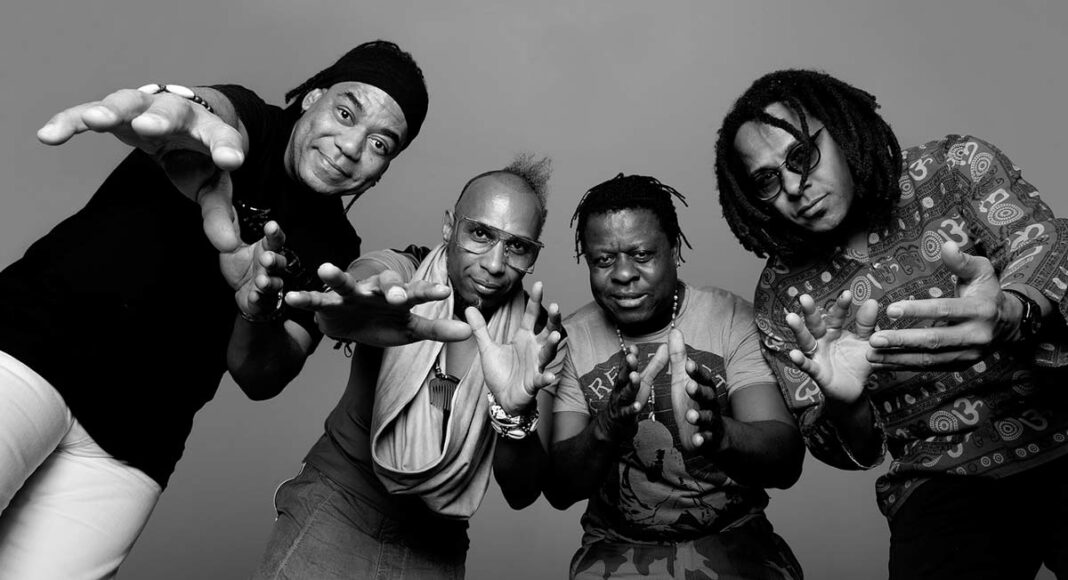Omar Sosa was born in Camagüey, Cuba in 1965 and began a relationship with rhythm at an early age. At 8, he began studying percussion and marimba, and later focused on piano at the Escuela Nacional de Música. He now performs worldwide—often 100 concerts a year—and is playing at Kuumbwa Jazz Center on Monday, April 11.
He’ll be joined by the rest of his Quarteto AfroCubano, featuring Ernesto Simpson on drums, Childo Tomas on electric bass and Leandro Saint-Hill on saxophone and flute. Sosa spoke to GT from Paris, where he was working on one of many new recording projects. His latest album is JOG.
What do you love most about Africa and African music?
OMAR SOSA: What I love in Africa first is how the people are grooving every single second. I discover new music just by talking to people in the street or in a restaurant. I discovered really amazing jazz musicians and percussion players. The rhythm and groove is part of their day-by-day life. We brought traditional [South African] musicians to the recording studio and one of the ladies was singing traditional songs. In the session she said, ‘Can I dance a little bit?’ I said, ‘Well, you can dance. It is not a problem.’ When she began dancing I told the sound engineer, ‘Please put some microphones on the floor!’ We have a song on the record that’s based on what she danced. Everything is rhythm in Africa. If we listen to our body, it’s rhythm. Our heart is rhythm. Our blood. What I try to do through music is bring out the groove I feel inside of myself.
Your performances feel like a joyful ceremony to me. What’s the connection between music and spirituality for you?
You are already connected with your spiritual world. The voice you hear inside is the voice of your spirit. The point is; how are you going to translate this? And how honest are you going to be with yourself to pass this message on without having some conflict with the market or media? I make music because it is the only way I can translate what comes through me. I wish I can do another thing; painting or writing books. The only way I can translate the voice of my spirit and ancestors is through music. If I stop this I feel some pain inside, physically. If I get the opportunity to say it, I say it!
Jazz is well-known for improvisation, but many forget that improvisation was an important realm for classical musicians like Bach, Haydn and Mozart. How important is improvisation for you?
Improvisation for me is 95 percent. I was close to telling you that it’s 100 percent. What makes me happy is to translate through music what I hear inside of me. It may not be jazz and may not be classical—it is what it is. What happened with classical music actually happened with jazz, too. A lot of music today is really calculated; ‘OK, we need to play this and tomorrow we’ll play the same thing.’ It’s not a problem, it’s another way to look at the picture. But the philosophy of jazz was freedom to create and express what you feel in the moment. And the moment is just the moment. One of the fundamentals of music is improvising. For me, the first jazz player was Mozart.
The voice you hear inside is the voice of your spirit. The point is; how are you going to translate this? And how honest are you going to be with yourself to pass this message on without having some conflict with the market or media? I make music because it is the only way I can translate what comes through me.
What do you think about the changes that are developing between Cuba and the United States, after a trade and travel embargo of more than 50 years?
We’re really close to the United States—less than one hour. Yet we cannot go to the U.S. and the American people cannot come to Cuba. I’ve waited for this opening and now we have a little bit. The embargo was really long, and, believe it or not, a lot of mentalities are not ready for this change. But it’s important to have this change.
Your music is sensitive at times, so delicately soft and sweet. At other moments it’s dynamic and bold.
Last year I was in the sacred forest of Limpopo [South Africa] and you feel a lot you’re never going to feel in big cities. When you commune with nature you feel it and incorporate elements of subtlety. I try to reproduce this through the piano. When I play songs, what I hear is the breeze or the birds. I’m really happy when this happens. We are part of nature. Sometimes we think we have power over nature but nature is always going to win. Music is my humble way to say ‘thank you’ to nature and for the opportunity to be alive on the planet at this moment in human history. This moment on Earth is an interesting moment! [Laughter] Every moment is an interesting moment.













